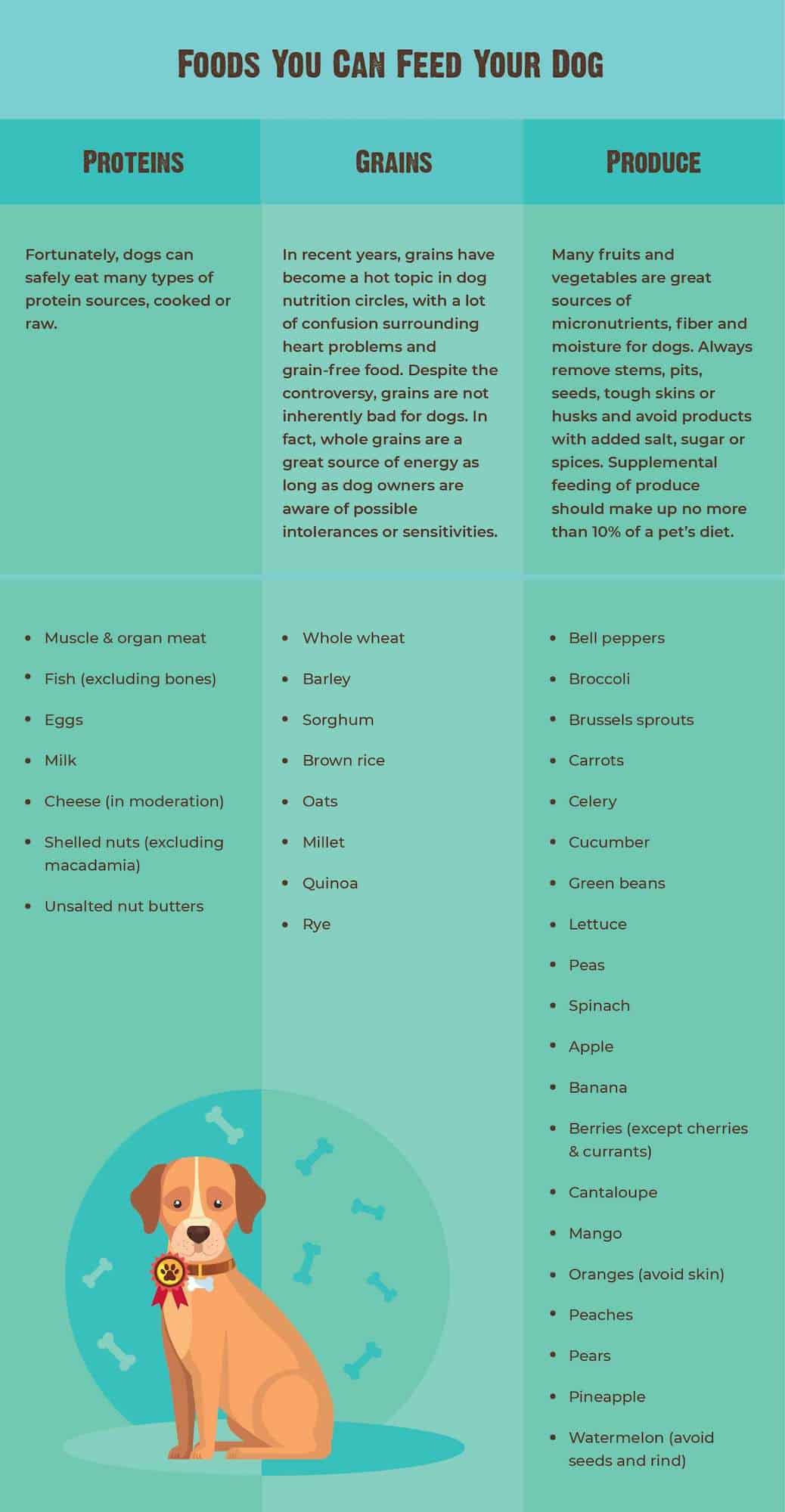As devoted dog parents, it’s natural to view our canine companions as cherished members of the family. This often leads to the temptation of sharing our own meals with them. However, dogs possess distinct nutritional requirements for optimal health, and feeding them table scraps isn’t just unsuitable—it can be dangerous. This guide will explore which human foods can be incorporated as treats or ingredients within a balanced canine diet, alongside crucial information on foods that dogs must avoid. [Dogs have specific nutritional needs to maintain optimal health].
It’s important to note that individual dogs may have unique allergies or sensitivities to foods not detailed here. For precise identification of the causes behind a dog’s adverse reactions to otherwise safe foods, an allergy panel or an elimination diet are the most effective methods.
Safe Human Foods for Canine Consumption
Moderation is paramount when offering supplemental foods, even those typically considered safe or healthy. Many dog owners mistakenly believe their pets can consume almost anything, with some dogs earning the nickname “vacuums” due to their habit of devouring any dropped morsel. The following information serves as a guide to proteins, grains, fruits, and vegetables that are generally approved for dogs. [Feeding your dog whatever you eat is not ideal, and may even be unsafe].
Proteins
- Cooked Lean Meats: Plain, cooked chicken, turkey, beef, and fish (like salmon or tuna, in moderation and without bones) are excellent sources of protein. Ensure they are free from added seasonings, onions, or garlic.
- Eggs: Cooked eggs are a highly digestible source of protein and provide essential amino acids.
Grains
- Cooked Rice: Plain white or brown rice can be a good source of carbohydrates for energy, especially when a dog has an upset stomach.
- Oatmeal: Cooked oatmeal, without added sugar or flavorings, is a good source of fiber and can be beneficial for digestion.
- Quinoa: This ancient grain is a complete protein and can be a healthy addition when cooked plain.
Fruits
- Apples: Remove the core and seeds, as they contain small amounts of cyanide. Apples are a good source of fiber and vitamins.
- Bananas: High in potassium and vitamins, bananas should be given in moderation due to their sugar content.
- Blueberries: These berries are packed with antioxidants and vitamins, making them a healthy treat.
- Watermelon: A hydrating fruit, watermelon should be given seedless and rindless.
Vegetables
- Carrots: Raw or cooked carrots are a great source of vitamins and fiber and are good for dental health.
- Green Beans: Plain steamed or raw green beans are low in calories and rich in vitamins and minerals.
- Sweet Potatoes: Cooked sweet potatoes (plain, without skin) offer vitamins and fiber.
- Broccoli: In small amounts, cooked broccoli can be a healthy addition, but large quantities may cause digestive upset.
Human Foods That Are Harmful to Dogs
While the term “good” or “bad” foods might be debated among human nutritionists, certain human foods pose significant risks, being toxic or capable of triggering allergic reactions in dogs. The subsequent information highlights foods that dogs must strictly avoid. [Foods bad for dogs].
Foods to Avoid
- Alliums (Onions, Garlic, Chives, Scallions): These are particularly dangerous as they can damage a dog’s red blood cells, leading to anemia. Garlic, in particular, can cause anemia with symptoms like rapid heart rate, pale gums, or general weakness. Monitor your dog’s health for several days after ingestion, as symptoms can be delayed.
- Macadamia Nuts: These nuts are highly poisonous to dogs. Ingesting them can result in increased body temperature, lethargy, and an inability to walk.
- Chocolate: Contrary to popular belief, chocolate is extremely toxic to dogs due to the presence of theobromine. Even small amounts, especially from dark chocolate varieties, can cause gastrointestinal distress. Larger quantities can lead to seizures, irregular heart rhythms, and potentially death. [What is the most dangerous human food for dogs?].
- Alcohol: Dogs are generally not drawn to the taste or smell of alcohol. However, if ingested, it can lead to serious health issues, including low blood sugar, low body temperature, lethargy, loss of coordination, vomiting, and slowed breathing.
- Xylitol: This artificial sweetener, commonly found in sugar-free gum and some baked goods, is highly toxic. It can cause a rapid drop in blood sugar and liver failure, leading to vomiting, lethargy, and loss of coordination.
Introducing New Foods Safely
When introducing your dog to new, safe human foods, the principles of moderation and gradual introduction are key to ensuring a smooth digestive process and positive tolerance.
However, if you observe any unusual symptoms or behavioral changes in your dog after consuming a new or atypical food, it is imperative to contact your veterinarian or the ASPCA’s Animal Poison Control hotline immediately. Even if symptoms appear minor, a follow-up with your veterinarian is recommended. [The Best Dog Food For Sensitive Stomachs].
For their primary meals, it is best to rely on food formulations specifically designed for dogs. High-quality dog foods rich in raw or minimally processed proteins, low in carbohydrates, and high in moisture are engineered to support a long and healthy life for your dog. With ingredient lists comprising items commonly found in human kitchens, products like RAWZ Meal-Free Dry Food and Gum-Free Wet Food offer the nutrition and flavors that dogs naturally love.

